Images from the Solothurner Literaturtage panel. Copyrights indicated.
I’ve resisted reading Blutbuch (Blood Book) by Kim de l’Horizon thus far, although the book received the prestigious German Book Prize (Deutscher Buchpreis) and the Swiss Book Prize (Schweizer Buchpreis), both in 2022. My fascination with language and culture finally brought me close to this, at the 45th Solothurner Literaturtage, a three-day literature festival in the charming Swiss town of Soleure. There was a panel discussion dedicated to the translation of Blutbuch.
The non-binary author, Kim de l’Horizon, encouraged the translators for English (Jamie Lee Searle) and for Croatian (Natasa Medved) not to translate the meaning but the feeling of strangeness – das Gefühl der Fremdheit. The English or Croatian reader should thus feel the author’s struggle with words to name, re-name or new-name the author’s “world”, they should stumble over our normalized and normalizing language.
At the same time, the flow of words should not get lost by translating words like “Mann“ (the German word for man) constantly with “Mensch“ (the German word for a human being). Only at specific moments, such as when the non-binary human being explains “it” to the parents.

Solothurner Literaturtage
English and Croatian would of course have their language-specific struggles and needs for creativity. English is a more gender-inclusive language, so “one” could be used easily but may lose the intended feeling the strangeness. In Croatian, the past tenses are more gender-constructed than the future tenses. Kim de l’Horizon was joyful that the Croatian future may see more open-mindedness in thinking and wording.
Another tricky playground for the translators: The use of Swiss German dialect words in the book and their socio-cultural nuances and particularities. Kim de l’Horizon speaks about “Mutti” – translated by Jamie Lee Searle as Ma, whereas she (Natasa) translated “Mutter” as Mother. Kim de l’Horizon also uses the French word word “mère” – in the Dialect of the Canton of Berne, it is used for “Mother”. In the French translation of the book, the translator followed Kim de l’Horizon’s encouragement to be creative and translated “mère” with “mer” (the ocean).
With “mer” for mother, we are not only in the middle of a feeling of strangeness, but of poetry as well.
- The Mother of the Ocean – #Andrea - May 25, 2023
- Poetic Insights – #Andrea - October 5, 2022
- Lightful: A Poetry Performance– #Andrea - May 13, 2022













Leave a Reply